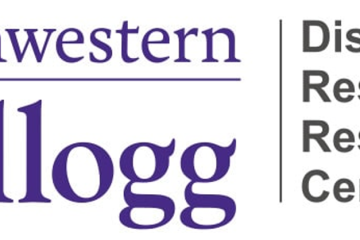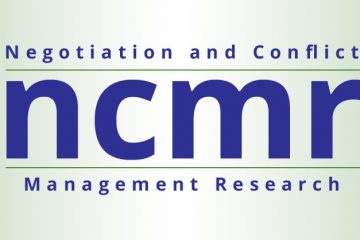NCMR 14(4) Table of Contents and Featured Article

Negotiation and Conflict Management Research 14(4) November 2021
Table of Contents
Negotiation strategy: A cross-cultural meta-analytic evaluation of theory and measurement
Brett J. M., Ramirez-Marin J., & Galoni C., (2021) Negotiation strategy: A cross-cultural meta-analytic evaluation of theory and measurement. Negotiation and Conflict Management Research, 14(4). https://lps.library.cmu.edu/NCMR/article/id/525/
Abstract: Negotiation theorists conceptualize negotiation strategy from a behavioral or a motivational perspective and negotiation researchers code transcripts or collect negotiators’ self-reports to operationalize it. This meta-analysis evaluates the functional similarities and differences between these different theoretical perspectives and approaches to measuring negotiation strategy as it predicts joint gains. We analyzed 3,899 unique negotiations from 76 independent samples and 46 different papers. Our results reveal that motivational and behavioral theories and self-report and behavioral coding measurements yield similar predictions and are functionally equivalent, significant predictors of joint gains. On the other hand, our analysis testing culture (Western versus East Asian, South Asian and Middle Eastern samples) as moderator reveals that the current theories and methods of measuring negotiation strategy are only significant predictors of joint gains in Western culture samples.
Servant leadership, third-party behavior, and emotional exhaustion of followers
Obi, I.-M. O., Bollen, K., Aaldering, H., Robjin, W., & Euwema, M. C. (2021). Servant leadership, third-party behavior, and emotional exhaustion of followers. Negotiation and Conflict Management Research, 14(4). https://doi.org/10.1111/ncmr.12184
Abstract: Conflicts are ubiquitous in all life’s domain where people live and perform interdependent tasks, including convents. Managing conflicts among followers is an essential responsibility of leaders. The way leaders behave while managing such conflicts have received little academic attention; available studies have focused on business contexts. This study aimed to examine the relationship between servant leadership, and emotional exhaustion through team conflicts, and further investigates the mediating role of leaders’ third-party conflict behaviors such as avoiding, forcing, and problem-solving. Data were gathered from 453 religious sisters (followers), in 166 convents, in a Catholic Women Religious Institute mostly based in Nigeria. Structural equation modeling confirmed that servant leadership was associated with reduced team conflicts through leaders’ third-party behaviors. Further findings showed that perceived servant leadership was negatively related to emotional exhaustion through a nonforcing expression. We discussed theoretical and practical implications.
Stepping back from the brink: A comparative analysis of ripeness theory and readiness theory in the U.S.-North Korea crisis of 2017–2018
Schiff, A. (2021). Stepping back from the brink: A comparative analysis of ripeness theory and readiness theory in the U.S.-North Korea crisis of 2017–2018. Negotiation and Conflict Management Research, 14(4). https://lps.library.cmu.edu/NCMR/article/id/459/
Abstract: This study assesses the usefulness of two theories, ripeness theory and readiness theory, in explaining de-escalation in intense crisis, when adversaries move toward formal negotiations. The U.S.-DPRK crisis in 2017–2018 serves as a case study for examining how each theory can contribute to our understanding of the fundamentals that facilitate a crisis de-escalation process. The study finds both theories instructive for understanding the U.S.-DPRK episode, but points to readiness theory as more insightful. Considering the multiple sources at play in the non-linear pre-negotiation phase, and specifically the central role played by a third party in moving the process forward, readiness theory provides a more profound and detailed understanding of the forces, their interplay and the gradual changes that led the parties to change their policy. This unique contribution of readiness theory can offer conflict parties and practitioners insights applicable to similar events in the future.
From the field to the laboratory: The theory‐practice research of Peter J. Carnevale
Putnam, L. L., Olekalns, M., Conlon, D. E., & De Dreu, C. K. W. (2021). From the field to the laboratory: The theory‐practice research of Peter J. Carnevale. Negotiation and Conflict Management Research, 14(4). https://doi.org/10.1111/ncmr.12185
Abstract: As colleagues and collaborators, we reflect on the work and legacy of Peter Carnevale, currently professor at the University of Southern California, and recipient of the 2002 Jeffrey Z. Rubin Theory-to-Practice Award of the International Association for Conflict Management (IACM). We review Carnevale’s main contributions, including his work on time pressure and surveillance, strategies for mediation, emotions in negotiation, and the use and integration of distinct methods for studying conflict and negotiation. We share personal anecdotes from our time as PhD students and collaborators with Peter Carnevale, and we touch on lessons learned for doing science and mentoring the next generation.
Featured Article
Stepping Back from the Brink: A Comparative Analysis of Ripeness Theory and Readiness Theory in the U.S.-North Korea Crisis of 2017–2018.
Author: Amira Schiff
Highlights from Schiff’s article include:
- Both ripeness theory and readiness theory shed light on the sources of change in the adversaries’ approach – from unilateral, coercive strategies to the bilateral option of diplomatic negotiation in intense crisis episodes such as the crisis in U.S.-North Korea relations in 2017–2018.
- Readiness theory stands out in its unique contribution; it provides a dynamic and detailed picture of the interplay of the multiple factors that induce changes in the motives and perceptions of crisis adversaries, including the role of intensive third-party involvement.
- Readiness theory offers an in-depth look at the impact of third-party interests, the pressure and mobilization strategies applied, and the interplay of these elements with the other antecedents of the parties’ agreement to embark on negotiation.
 Amira Schiff is the Director of the Conflict Resolution, Management & Negotiation Graduate Program at Bar-Ilan University. Her research interests include peace processes, conflict management, and negotiation in international conflicts. She has published articles in International Studies Perspectives, Negotiation and Conflict Management Research, and International Negotiation, as well as having written her book Negotiating Intractable Conflicts: Readiness Theory Revisited, published by Routledge.
Amira Schiff is the Director of the Conflict Resolution, Management & Negotiation Graduate Program at Bar-Ilan University. Her research interests include peace processes, conflict management, and negotiation in international conflicts. She has published articles in International Studies Perspectives, Negotiation and Conflict Management Research, and International Negotiation, as well as having written her book Negotiating Intractable Conflicts: Readiness Theory Revisited, published by Routledge.


